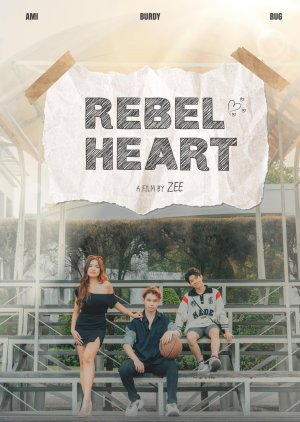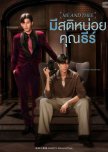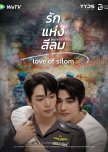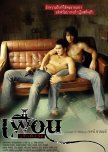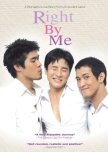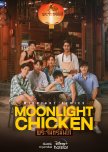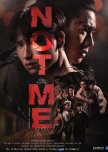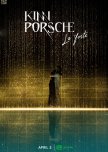This essay cannot explain the film's title...who is the rebel?
Watching an unheralded short film is always a gamble. Quality can be erratic, especially given the prevalence of student films in the form. Rebel Heart is a short BL film (26 minutes) released by Iamzee Studios in October 2023. Since the closing credits list “Zee” as the scriptwriter, director, and OST singer, one conjectures this project is some kind of a self-financed production conceived by the studio’s namesake. Whether it is a student film or a vanity project, it displays the earmarks of films of that ilk: low budget, rough production values, and a less-than-professional feel. Every contributor listed in the closing credits is identified only by a single name. As of the date I watched the film, two weeks after its release, the MDL page for Rebel Heart contained a skimpy plot summary but absolutely no information regarding the cast, the director, or anyone else. Nothing that might speak to the pedigree within the film industry of the creative team behind the project. Deprived of any information that that might inform expectations regarding production value, actors’ ability, or director’s nous, I set the bar of expectation to "amateur." Despite that low level, I forged ahead with an open mind.A short film has three basic jobs: to hook the audience right away via compelling character or an intriguing story, to sustain their interest long enough for some problem to be solved or examined, to deliver an ending that at the very least enables the viewer to walk away without concluding their time has been wasted. Rebel Heart checked one of those three boxes but whiffed on the other two. Though often shaky, the production value proved better than I expected. Grudgingly, I concede the film satisfied the minimal expectations I had. The story was messy, chaotic in the telling, and lacked the crispness one would expect from polished filmmakers. But if (and I do not KNOW the answer) those associated with Rebel Heart churned out a homemade or student film, then this result counts as a respectable effort--and rookies deserve our eyeballs and understanding. Who should watch? For starters, BL fans who regard themselves as completists can go ahead and track down this short film on YouTube. Rebel Heart will pass muster for a 30 minute investment of time. Others should proceed only if they seek it out full of goodwill for low budget results and full of tolerance for touches of messiness. Perfectionists will be frustrated.
The opening scene offered a solid start. High school student Lucas (Bug) speaks directly to camera. He will narrate chunks of the film via voiceover. His first comments lament the loneliness of being a third-wheel in his own friend group, and the resultant sense of not belonging that follows from that. Since almost all of us have at least a passing acquaintance with being a third wheel, these opening lines rather deftly draw the viewer to empathize with Lucas. Thus, Rebel Heart successfully hooks its audience within the first minute via their identification with lonely Lucas. The self-described Third Wheel then segues into a history of his friendship with Ben (Burdy) and Emma (Ami). Lucas and Ben met as high school freshman and became fast friends. The film was billed as BL, and Lucas rather clearly likes Ben as more than a friend. Fearing rejection if this crush broke into the open, Lucas did his best to conceal it. Ben’s feelings toward Lucas are a cipher at this stage, which makes sense because the point of view reflects Lucas’s understanding of their situation. The opening monolog provides a solid introduction to the lead character, and the central problem appears to be clear: how will Lucas resolve his sense of alienation? Since that is a universal theme for a high school-set story, the short film appeared to have launched itself successfully.
The arrival of new student Emma during Ben’s and Lucas’s senior year disrupted the duo’s routines. Emma, whose dialog is exclusively in English (whether spoken by her or to her), clearly fancies Ben, and her attentions account for the sense of exclusion endured by our suffering hero Lucas. Stolid wingman that he is, Lucas facilitates the putative couple’s chances to spend time alone together by removing himself from their company whenever Emma sidles up to Ben. Lucas clearly resents the loss of his closest friend’s sole attention, and via voiceover, he expresses the film’s central problem, “It hurts to see the person you care about the most choose someone else over you.” I think this premise provided Rebel Heart with a solid foundation to build a short film around. High school alienation stories have floated around forever, and coming out stories are nowadays commonplace. But their very ubiquity demonstrates confirms the appeal of these tropes. A small, compact story with seemingly minor stakes will still resonate with an audience if it is told well. With only twenty-five minutes to tell the whole tale, why complicate the narrative with unnecessary grandeur?
Unfortunately, the film abandons the viable love triangle premise within ten minutes. Rotating into the compact time frame arrives not one new story arc, but two. First, a montage/pastiche of boy-romances-boy-in-one-day scenes. Second, a preachy coming-out-to-family sequence that both extolls the virtue of loving queer sons and brothers and fails to track in internal logic. I shall omit the plot specifics of these replacement arcs, but the details include a confession by Lucas to Ben, a confession by Ben to Lucas, a kissing scene performed and filmed more convincingly than many BL series manage to do, a bizarre adventure in a mall (see Random Thoughts below for highlights), an angry, homophobic father rejecting his son over some photos he happens to have seen on his phone (from whom? of what?), a mother talking dad down from his bigoted dudgeon, a happy family reconciliation, and an outsider (Ben) interjecting himself into the Lucas’s family turmoil despite meeting them for the first time. (Wait, weren’t these guys best buddies for three years? The parents hadn’t previously met their child’s closest friend?) Oh, I forgot to mention the hitman. No, not an assassin. A bully hired to hit people. (You’ll have to watch. Spoilers.) That’s an awful lot to cram into fifteen minutes, and perhaps Rebel Heart feels overstuffed at the end. I finished the film with the sense that if the story had mined the pathos of the lonely kid for all the inherent potential in that initial Third Wheel premise, it might have told a thoughtful, touching story and still been able to inject some commentary on coming out and acceptance.
Short films can seldom conceal the constraints of low-budget filmmaking, and Rebel Heart suffers in some technical aspects. Curious jump cuts reflect questionable editing skills and mask abrupt jumps in narrative direction. The audio mixing during street scenes swallowed the dialog in spots. Nevertheless, I am willing to tolerate such flaws from a production with clearly limited resources, and none of these problems become egregious. Director Zee did a good job of positioning his camera for each scene, and the mix of close-ups to longer shots was effective. If Rebel Heart is Zee’s fledgling effort, that strong opening at least suggests the director understands how to pinpoint universal themes in human experience and emotion. Recognizing value in the telling of a small tale and understanding when to let ambition expand scope and grandeur will be their next challenge.
Random thoughts:
• One nice touch: Lucas opens the film wearing a T-shirt reading “Love Sick.” Whether this slogan represents a subtle nod toward the 2014 series that launched the BL craze in Thailand or a subtle clue regarding Lucas’s inner head space, the shirt helps to frame the emotional stakes.
• One not so nice touch: Ben breaks up with Emma via text and then immediately blocks her. She absolutely earned the dumping on her own merits, but that is never a classy way to exit a relationship. Besides, a face-to-face telling off not only satisfies the demands of chivalry, such a confrontation delivers a much more satisfying jolt of audience satisfaction to boot. She does reappear, but the ensuing confrontation was disappointingly clunky in execution.
• Scenes set at Bangkok's big malls feel like a required element in the telling of a high school story, so perhaps it was inevitable Lucas and Ben traipsed through one on their big day together. The more curious events included trying on clothes only to flee in a full sprint from the store for no apparent reason and crashing a wedding reception while a random bride and groom sang of their love for one another. More traditional activities included a flirty stroll through the lobby of a muliplex cinema.
• The singing marital party certainly felt out of place. Since the credits list Zee as a singer, perhaps the director inserted himself into the picture? If so, confident move, Mr Hitchcock.
• Later, the boys navigate through a cinema lobby where the onesheet poster for the Barbie movie will forever situate this film's production in mid-2023.
• Aside from Emma, Lucas’s Dad also speaks only in English, and other characters speak to him only in English as well. I don’t have a point. It just stuck out to me.
• As did the slight southern drawl in Dad’s accent. The homophobia spewing out of Dad sounded more authentic with that regional twang. American gays will flinch in recognition.
• Ben addresses Lucas’s parents as Mr Evans and Mrs Evans. That politeness makes Ben the first kid since the 1980s who resorted to formal titles rather than first names with the (American) parents of his friend. As a child of the ‘80s myself, I kind of appreciated this touch.
Was this review helpful to you?

This review may contain spoilers
A film that contributes to the fight for LGTBIQ+ rights
Over the last 15 years, LGTBIQ+ rights have made a significant leap and we owe a small part of it to cinema and television, increasingly committed to representing more and better gay, lesbian, bisexual, trans people. or non-binary identities. Although this drastic advance (at least, in the audiovisual field) is undoubtedly worth celebrating, it should not make us forget the struggles and sufferings of so many generations that preceded us.After this preamble, let's get into the matter:
If love is complicated between two people, imagine what it must be like when there are three of them. Imagine also when homophobia, internalized homophobia, harassment and forced coming out of the closet are added to the love triangle.
We have all this in equal parts in Rebel Heart, the 2023 Thai short film, youth romantic genre and LGBTIQ+ theme, written and directed by Zee, which also addresses themes such as love, friendship, personal growth, honesty and the trust.
It strikes me that the three main characters have their names in English and not the typical Thai names that seem very curious because they are strange or out of the ordinary to the Western viewer.
The film, from Iamzee Studios, begins when Lucas, the main character, breaks the fourth wall and comes into direct contact with the audience, looking and speaking directly to the camera, to introduce us to the story. From that moment on, the play hooks us and we feel part of an emotional roller coaster, a challenging journey in which we will find connection and meaning with the two young protagonists: Ben, played by Burdy, and Lucas, played by Bug, while They navigate the ups and downs of their relationship. Throughout the 25 minutes of footage, the characters explore different challenges and emotions.
Lucas has secretly loved Ben for three years, but he has not dared to express his feelings, because he considers that his best friend is heterosexual, in addition to fearing breaking the bond between them. They are both university students and have known each other since the first days of entering university. And now, in the last year of their studies, they will end the beginning of an adventure that will determine their destinies.
At first glance it seems like a very common story, but the dynamic between the two friends changes when Emma (Ami) appears, a college student girl who frequently surrounds Ben with attention, causing internal conflicts between the three young people, such as jealousy, pain and drama, especially in Lucas's character, when he discovers that Ben and Emma are in a relationship. Then external conflicts will arise, which I will explain later.
But this will not be a love triangle motivated as a way to escape, give life to a dying relationship, discover something new, take risks and get out of the comfort zone or other reasons that we have seen previously. Here an element rarely used in BL is introduced that will mark the relationship of three people now: internalized homophobia. However, like any love triangle, it will teach us something important.
At one point, we will discover that Emma, motivated by homophobia, has hired a bully, played by Pomp, to harass and beat Lucas, since she has understood his interest in Ben and suspects the closeness of the two young people. Realizing this, Ben breaks up with Emma and blocks her on the internet.
And it is here that the viewer discovers that Ben was the first to fall in love with Lucas and if they have been friends and shared a bedroom and time together it is because he has encouraged it by approaching Lucas from the first moment. I mean, Ben is not straight. Ben is not bisexual. Ben is a gay boy, a victim of internalized homophobia who chooses to hide his homosexuality by getting involved in romantic relationships with girls. In this way, the viewer can explain why Ben distances himself from Lucas and is dating Emma.
Upon discovering that Emma has planned to harm Lucas, Ben finally accepts himself and, in return, admits his love for the boy with whom he has also been in love for more than three years. It is then that, in addition to facing Emma's betrayal between them, they are ready for a life together, but not before seeking parental approval, something very common in heteronormative and patriarchal societies.
And it is here that the external conflict that the couple experiences is incorporated into the film: the rejection of their son's homosexual relationship by Lucas's father. Thanks to the intervention of the mother (Ajarn Jiab), in charge of pointing out the truth, she made the father realize what is important. With a strong message about how we could act in similar situations, out of love for his son, Mr. Evans overcomes his prejudices and ends up accepting the two children, first as lovers and then as his own children.
Likewise, we will learn that the reason for the father's rejection of his son's homosexuality is motivated by his personal experience, having had a suicidal brother who fought against the pain and suffering of also being a gay person, and how this experience could be reflected in the life of his own son and not wanting him to suffer the same fate as his brother.
While the way Ben breaks up with Emma is wrong, the way Emma outing Lucas to her father is disgusting and totally despicable. I can't explain how he came to receive the loving images of the two boys on his phone (this must have been what the father saw, since it is not shown and is not necessary for its full understanding by the viewer) but rather as an act of retaliation against Ben by Emma.
The film, while I was watching it, made me feel that it had an autobiographical nature. Perhaps the director lived a similar story firsthand, or learned about it from third parties, and captured it in images.
Despite the low budget, a cast made up of amateur actors, a weak script and a short plot, poorly developed characters and events, which affects the general quality of the product, it is surprising for having a Thai-American technical and acting team, the integration of an interracial marriage, the use of Thai and English languages, all unusual in BL productions from this Southeast Asian country, and above all for contributing to equality, visibility, acceptance, recognition and, more importantly, the legality of LGBT+ people, in a nation that still does not recognize same-sex marriage. Also, because the short film addresses the topic outside of stereotypes, caricatures or exaggerated dramas. For this alone the short is worth watching.
Was this review helpful to you?

Sweet amateur production
Rebel Heart sort of falls between two chairs: well made but too long and too plot packed for a student film, not tightly paced enough and not all that technically good for a professional production,. Conflicts get resolved very easily or just go away, after some initial quite good minutes or film. Still, it has the charm of a production made because someone really wanted to, and I'd like to see the father's background explored more - with some more experience and a bit better budget for the filmmaker. This wasn't a waste of half an hour.Was this review helpful to you?

